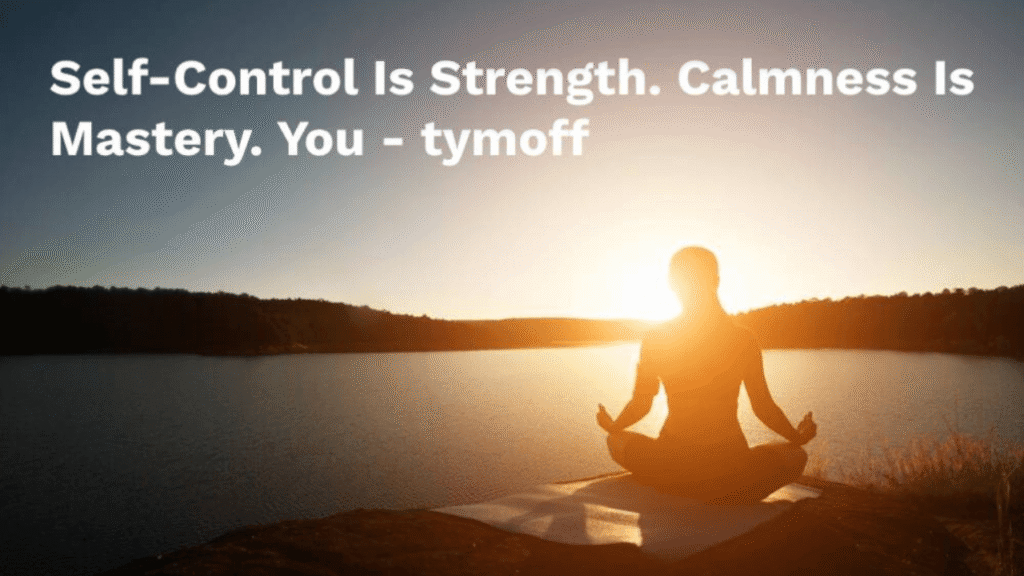Where people don’t react instantly with anger, where discipline guides choices, and where peace of mind trumps chaos. In such a world, the quote “Self-control is strength. Calmness is mastery. You – Tymoff” becomes not only powerful—it becomes essential.
Today, instant reactions dominate our lives. Notifications, arguments, trends—everything demands a response. But those who pause, reflect, and act with intention are the ones who rise above the noise. Tymoff’s quote is a profound reminder that true power is internal. In this blog, we’ll unpack the wisdom behind these words, understand their real-world relevance, and learn how to practice them for a better, more focused life.
The Meaning Behind Tymoff Quote

Understanding Self-Control as Strength
Self-control is one of the most underrated forms of power. It’s the ability to pause before acting, to reflect before speaking, and to choose what’s right over what’s easy. Whether it’s resisting temptation, managing emotions, or maintaining focus, self-control acts as an inner compass.
Without self-control, even the most intelligent or skilled individuals can falter. A moment of anger can ruin a relationship. A careless financial decision can destroy years of savings. True strength lies in restraint, not in reaction. It requires courage to walk away from conflict, delay gratification, or admit you’re wrong.
Calmness as a Form of Mastery
Calmness is not simply the absence of anger—it’s the presence of awareness. Mastery comes when you can remain composed in chaos, unshaken by insults or stress. Think of a skilled surgeon, a seasoned negotiator, or a wise teacher. They all share one trait: calmness under pressure.
When you’re calm, you see the bigger picture. Emotions settle, logic rises. You’re no longer a puppet to your moods—you’re the master of your mind. This form of mental clarity and emotional stability doesn’t just benefit you—it influences everyone around you.
Why Self-Control is Strength in Modern Times
In our digital-first culture, where everything is available at the tap of a button, self-control has become a rare superpower.
Emotional Regulation in a Trigger-Happy Culture
Social media thrives on outrage. Platforms are designed to provoke responses—likes, comments, retweets. Yet reacting without thinking often leads to regret, embarrassment, or misinformation. Self-control allows you to pause, process, and respond intelligently.
It’s the reason some people excel in crisis—they have trained themselves not to act impulsively. By resisting emotional triggers, you gain clarity and long-term perspective.
Long-Term Vision Over Instant Gratification
Self-control fuels success in nearly every area—finance, fitness, career, and relationships. The difference between failure and achievement often lies in choosing what you want most over what you want now.
Do you want the pleasure of skipping your workout—or the reward of being fit six months later? Do you spend impulsively or save for future goals? These daily decisions, though small, shape your entire life. Practicing self-control is how you build consistency, character, and trust in yourself.
Calmness is Mastery: More Than Just Inner Peace
Remaining calm doesn’t mean you don’t feel stress—it means you don’t let stress control your actions.
Calmness During Conflict
When tempers flare, those who stay calm win. Not in a competitive way—but in a dignified, emotionally intelligent way. Calmness in conflict allows you to listen better, speak clearly, and de-escalate tension.
It’s the reason top leaders, therapists, and mediators are trained in emotional control. Calm people hold space for others without getting sucked into the storm.
Calmness and Clarity
Clarity and calmness go hand-in-hand. A calm mind doesn’t panic, rush, or assume—it observes and decides. Whether you’re making a major life decision or responding to criticism, staying calm gives you mental sharpness and emotional control.
Cultivating Calm Through Mindfulness
Mindfulness is more than meditation. It’s about noticing your emotions in the moment without letting them define you. Calmness comes from practicing awareness.
Start by taking 3 deep breaths before reacting. Create short pauses during the day. Over time, you’ll notice your stress levels dropping and your control rising. Calmness becomes a practiced habit—not just a moment of peace.
The Psychology Behind Self-Control and Calmness

Science supports what Tymoff implies: your brain can be trained for calmness and control.
Willpower as a Muscle
Willpower depletes with overuse, but like a muscle, it strengthens with training. Start with small habits—wake up early, drink more water, reduce social media. Each success boosts your self-belief and builds mental resilience.
Emotional Intelligence (EQ)
People with high EQs manage themselves and understand others. Self-control and calmness are the foundations of EQ, influencing leadership ability, teamwork, and communication.
In fact, studies show that emotional intelligence predicts success more than IQ in many professions.
Neuroplasticity: You Can Rewire Your Brain
Your brain is adaptable. With repetition, you can create new mental patterns. If you consistently practice calmness and self-discipline, your brain begins to default to these behaviors. You stop reacting and start responding.
Real-Life Applications of Tymoff Philosophy
The power of self-control and calmness becomes evident when applied to real-life scenarios.
In Leadership
The best leaders remain poised under pressure. Whether managing teams or making decisions, they show confidence and composure. When you lead with calmness, you inspire trust. Self-control ensures that your leadership is intentional, not impulsive.
In Relationships
Arguments, jealousy, and miscommunication destroy relationships. But those who stay calm can diffuse tension, listen better, and resolve conflicts faster. Self-control keeps you from saying things you’ll regret. Calmness gives you the space to understand your partner’s perspective.
In Career Growth
Careers are marathons, not sprints. Whether it’s facing job rejection, handling a toxic coworker, or chasing promotion, calmness helps you think long-term. With self-control, you avoid office politics, resist quitting too early, and stay focused on your goals.
Daily Practices to Build Self-Control

Self-control is built with intention. Here are powerful daily practices:
1. Morning Routines
How you begin your day shapes your energy. Avoid rushing or checking your phone. Instead, try 10 minutes of meditation, stretching, or journaling. This creates a centered and intentional mindset.
2. Goal Setting
Create SMART goals (Specific, Measurable, Achievable, Relevant, Time-bound). Clear goals help you prioritize and filter out distractions.
3. Digital Detox
Reduce screen time, unfollow toxic pages, and schedule phone-free hours. It helps your brain regain focus and resist attention hijacking.
4. Diet and Sleep
What you eat and how you sleep affect your mental strength. Stay hydrated, reduce sugar, and aim for 7–8 hours of quality sleep to support your willpower and focus.
Practices to Master Calmness
Calmness is an inner state you must nurture regularly.
1. Breath Control
Use the 4-7-8 technique (inhale 4 sec, hold 7 sec, exhale 8 sec) before meetings, decisions, or emotional conversations. It instantly calms the nervous system.
2. Meditation
Apps like Headspace or Insight Timer make meditation easy. Just 5 minutes a day helps you observe thoughts without judgment, boosting calmness over time.
3. Journaling
Use journaling to offload negative emotions. This practice promotes clarity and allows you to reflect calmly.
4. Nature Walks
Regular walks in parks, forests, or gardens lower cortisol and improve mental stillness. Nature naturally promotes calm.
Misconceptions About Calm and Controlled People
They Are Weak or Passive
Wrong. It takes tremendous strength to remain calm when provoked. True calmness comes from confidence, not fear.
They Are Emotionless
Calm people don’t suppress emotions—they process them. They feel everything, but act only when needed, not reactively.
They Are Slow to React
Calmness leads to faster and wiser decision-making in the long run. Rash decisions often require more cleanup later.
The Role of Stoicism in Tymoff Philosophy
The quote reflects deep stoic wisdom—focus on what you can control, let go of what you can’t.
Stoic Principles
- You control your response, not the outcome
- Pain is inevitable, but suffering is optional
- Live with virtue, not emotion
By applying these ideas, you train your mind to serve you, not sabotage you.
You: The Final Piece of the Puzzle

Accountability and Self-Growth
No one can make you calm or disciplined. It’s a personal practice. When you stop blaming the world and take ownership, growth accelerates.
Self-Empowerment
Every moment offers a choice: react or respond. When you choose wisely, you reclaim power. Tymoff’s quote invites you to step into your highest self—not someday, but now.
Integrating the Philosophy Into Your Life
Theories mean little without action. Here’s how to live out the quote every day.
Weekly Check-Ins
Set aside 10 minutes every Sunday to reflect. Where did you react impulsively? Where did you remain composed? Use this time to adjust your focus for the week ahead.
Be Your Own Role Model
Don’t just admire calm, controlled people—be one. Your example could inspire friends, family, and even strangers.
The Ripple Effect of Self-Control and Calmness
Your energy influences others more than you realize.
Influence on Others
In tense situations, your calmness sets the tone. People begin mirroring your grounded behavior, leading to healthier dynamics.
Breaking the Cycle of Reactivity
By refusing to engage in drama or hostility, you help end patterns of emotional chaos in relationships, work, and communities.
Quotes That Align with Tymoff Message
“Calmness is the cradle of power.” – Josiah Gilbert Holland
“Discipline is the bridge between goals and accomplishment.” – Jim Rohn
“You cannot control the wind, but you can adjust the sails.” – Unknown
Frequently Asked Questions (FAQs)
Q1: Who is Tymoff?
Tymoff is a modern philosophical content creator whose quotes reflect deep emotional intelligence and personal development insights. Though not widely publicized, his quotes have gone viral for their simplicity and truth.
Q2: How do I become more self-controlled?
Start small—practice delaying gratification, managing impulses, and focusing on long-term goals. Use habit tracking and mindfulness techniques to build mental strength.
Q3: How does calmness benefit mental health?
Calmness reduces anxiety, improves clarity, lowers stress hormones, and enhances decision-making. It also contributes to stronger emotional resilience.
Q4: Can calmness be learned?
Absolutely. With regular mindfulness, breathwork, and emotional awareness, anyone can train themselves to remain calm in any situation.
Q5: What is the best way to live by Tymoff’s quote?
Make calmness and self-control a lifestyle, not a reaction. Practice it in thoughts, speech, actions, and choices every day.
Conclusion: Become the Calm Force in a Noisy World
“Self-control is strength. Calmness is mastery. You – Tymoff.” These are not just words; they are a roadmap for personal power. In a world full of noise, chaos, and distraction, you can be the calm, clear, and disciplined force that inspires others and transforms your own life.
If you found strength in Tymoff’s reflection on self-control and calmness, don’t miss our deep dive into another profound quote: “Love what you have before life teaches you to love.” This piece explores the value of gratitude, presence, and emotional awareness in everyday life.